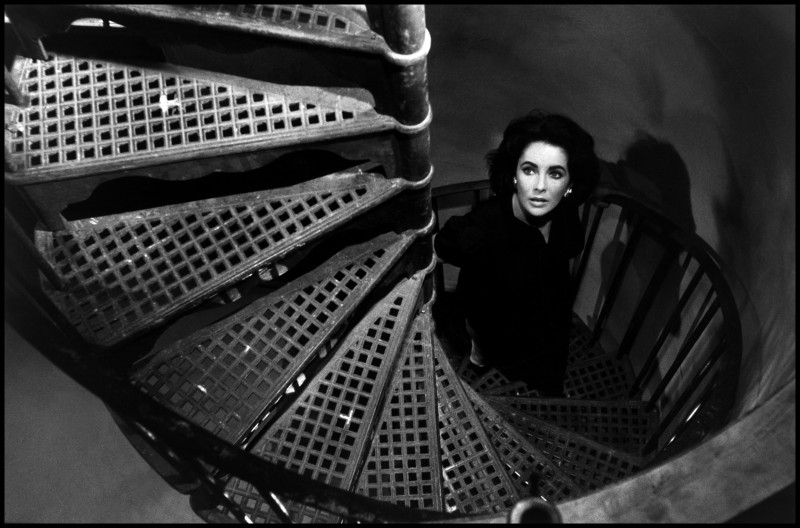Elizabeth Taylor in Suddenly, Last Summer (1959)
By André Crous
It is truly remarkable that this film, whose subject is always implied but never mentioned by name, can have such a strong impact on a viewer who has grown up in a much less restricted era of movie-going. I knew this film from a Gore Vidal interview in The Celluloid Closet, in which he, the screenwriter, admitted that the finale was overblown, and the very visible reference to the demise of Frankenstein’s monster in the film by director James Whale was a bit over-the-top. I knew that the unseen protagonist was gay and killed because of his sexuality, so I did go into the film suspicious of the words about him, wary of things said and particularly of things unsaid. Perhaps this knowledge made me susceptible to a positive bias towards the film. On the other hand, the film pretends to look for the truth and yet persists in obscuring this most basic component of the story, always putting up a smokescreen in front of the viewer. And nonetheless, the film is intriguing from beginning to end.
A young woman named Catherine Holly has been diagnosed with dementia praecox following the death of her cousin, Sebastian Venable, at the hands of a street mob in Cabeza de Lobo, Spain, the previous summer. The reason for the death, and the exact way in which he died, remain a mystery until the very end, but our suspicions grow about the exact nature of the relationship between the two cousins when Sebastian’s overprotective mother, Violet, wants to have Catherine lobotomised for “babbling” about the events of Sebastian’s final hours. The doctor who is to perform this operation is Cukrowicz, who tries to piece together the puzzle from the fragments given to him by the supposedly insane Catherine and Sebastian’s snobbish mother.
While the screenwriters were obliged to remove references to homosexuality, it is significant that Montgomery Clift was chosen to play Dr Cukrowicz, whom Violet mistakes for her own son. Clift was gay, and even though nothing is intimated about his character’s sexuality, his casting could not have been unrelated to his sexuality. Perhaps that is a sweeping statement, but it makes perfect sense in this film where so much had to be suggestive rather than overt.
By means of imagery such as the Venus flytrap and the painting of Saint Sebastian, the film prepares us for the swallowing of poor Sebastian by the angry mob in the film’s final act. “Nature is not created in the image of man’s compassion”, says Dr Cukrowicz, and this statement, made early in the film, after Violet’s account of the “flesh-eating birds” that ravage the young sea turtles on the Galápagos Islands, paints a truthful though ominous picture of the world that will be revealed to us. “[T]he ones who eat flesh, the killers, inherited the earth. But then, they always do, don’t they?”
Cukrowicz is a serious man who barely ever blinks and is aware of the experimental nature of the work he does. In his very first scene, in the hospital’s operating room, director Mankiewicz heightens the tension with small details, both visual and auditory, that include a constant buzzing in the background. Katherine Hepburn is marvellously stiff upper-lip as Violet Venable, who has a borderline incestuous obsession with her late son. The character of Catherine is the only place where the film and the story trips up, ever so slightly: She is put, under Cukrowicz’s care, in what seems to be the least protected mental institution in the world, where she roams freely, provoking all kinds of riots among both male and female patients. Elizabeth Taylor, who plays this role, is also in the unenviable position of appearing onscreen for the first time after we have spent a long and poignant scene in the company of Clift and Hepburn, and her acting (or her character) is no match for theirs.
Suddenly, Last Summer is a joy to behold, even more so today, because the care with which Vidal (and Williams, although he distanced himself from the film) removed the references to Sebastian’s homosexuality while leaving in just enough to make us wonder. The casting of Clift and the image of Sebastian being devoured by a mob of young men are equally impressive and give ample food for thought, as they imply what could not be said outright.
—
Country USA
Released 1959
Director(s) Joseph L. Mankiewicz
Screenwriter(s) Gore Vidal, Tennessee Williams
Directors of Photography Jack Hildyard
Running Time 114 minutes
André Crous is a professional film critic and a member of FIPRESCI. He holds a French honour’s degree, two master’s degrees and a Ph.D. His research examined the works of Francois Truffaut, Mikhail Kalatazov, Martin Scorcese, Paul Thomas Anderson and Michael Winterbottom. He writes about movies in his blog, Celluloid Paradiso and lives in Prague, Czech Republic. | Read More ⟩



